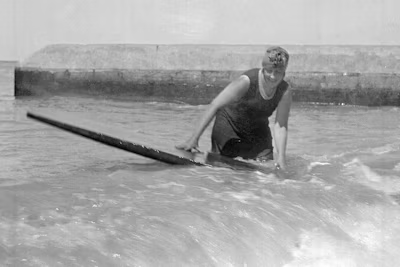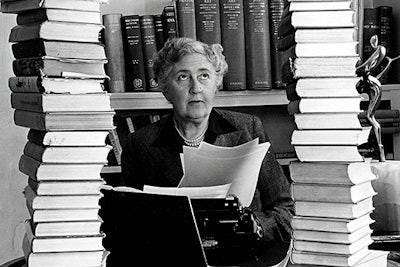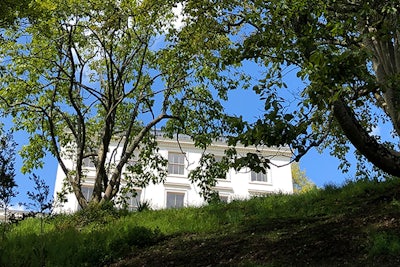
About Agatha Christie
Writer, Traveller, Playwright, Wife, Mother, Surfer

Born in Torquay in 1890, Agatha Christie became, and remains, the best-selling novelist of all time.
She is best known for her 66 detective novels and 14 short story collections, as well as the world’s longest-running play – The Mousetrap. Her books have sold over a billion copies in the English language and a billion in translation.
Image © The Christie Archive Trust
What can I say at seventy-five? ‘Thank God for my good life, and for all the love that has been given to me.
Christie's Life

The Early Years
Agatha Mary Clarissa Miller was born on 15th September 1890. Her father was a wealthy American man called Frederick Miller, and her mother was Clara, the Irish niece of Frederick’s father’s second wife.
Frederick and Clara had finally settled in Torquay, a popular resort on the South Devon coast, and baby Agatha came along as a “much-loved afterthought”, ten years after her brother Monty, and eleven after her sister Madge. The family lived a comfortably well-off existence at Ashfield, a large home not far from the sea with a big garden and plenty of places for little girls to play.
Image © The Christie Archive Trust

Poirot is Born
Agatha continued her wartime work as a nurse until 1915 when she joined the hospital dispensary. She trained under an experienced pharmacist, who carried a lump of curare in his pocket as it made him feel powerful! In 1917 she completed the exam of the Worshipful Society of Apothecaries.
It was during this time that Agatha decided to write a detective story, after her sister Madge bet that she couldn’t write a good one. Agatha rose to the challenge, at the same time seeking to relieve some of the monotony of dispensing. She first worked out her plot and then “found” her murderer on a tram in Torquay. As for her detective…

A Difficult Period
The first novel Agatha wrote for Collins went on to become one of the most famous murder mystery novels of all time. The Murder of Roger Ackroyd was published in 1926, and with hugely impressive sales numbers was the book that defined Agatha’s career.
However, 1926 was also a year of immense sadness. In April 1926 Agatha’s beloved mother died at Ashfield, and she was faced with clearing out the family home alone while struggling to write. Separated by distance and strained by grief, Archie and Agatha’s relationship broke down when Archie fell in love with fellow golfer and friend of the family, Nancy Neele.

A New Start
At a dinner party in 1928 Agatha met a young couple who had just returned from Baghdad. Inspired by their accounts of the Middle East, she cancelled a planned trip to the West Indies and booked a ticket on the Orient Express, realising a lifelong ambition to travel on the luxury train. Surprisingly for a single woman at this time, Agatha journeyed alone, meeting plenty of interesting characters along the way.
From Baghdad she set out across the desert to the archaeological site at Ur, where she became friends with eminent archaeologist Leonard Woolley and his wife Katherine.
Image © The Christie Archive Trust

The War Years
In September 1939, Agatha and Max were in the kitchen at Greenway when they heard the news everyone had been dreading: Britain was at war with Germany. They decided to remain at Greenway for the time being, Max volunteering for the Home Guard and Agatha once again working in the hospital dispensary in Torquay. Max was dissatisfied with his contribution to the war effort, however, and in 1940 they moved back to London where he found work, letting Greenway to evacuees.
Agatha’s creative output continued apace, as she found herself able to escape from the horrors of the real world into her writing.

The Later Years
By 1945 and the end of the war, Agatha had realised the tax implications of writing so much. She became less prolific, aiming for one novel a year (a Christie for Christmas) and focusing on playwriting. Work on archaeological digs also resumed, and the Mallowans found themselves back out in Iraq.
Film and television productions were also beginning to make their mark, including the 1945 classic telling of And Then There Were None from René Clair. Then, in late 1946, Agatha’s cover as Mary Westmacott was blown by an American reviewer of Absent in the Spring. She was disappointed as she had enjoyed the freedom of the pseudonym.
Image © The Christie Archive Trust
Discover more about Agatha Christie

Christie's favourite Christie
Read more about the Queen of Crime and discover which stories were her favourites.

How Christie wrote
Overheard conversations, notebooks and Dictaphones: read the secrets of Agatha Christie’s writing career.

Christie's Wallingford
Discover Agatha Christie's Wallingford, the location of Winterbrook House which was the home of Agatha and Max Mallowan
About Agatha Christie's Travels

Childhood and Adolescence Overseas
When Agatha was five or six, her family’s difficult financial situation drove them to the more economical solution of renting out their Torquay home and spending time in various hotels in France. They stayed in the Pyrenees, Paris and Brittany, all of which proved formative for the young girl.
“The two winters and one summer that I spent in Paris were some of the happiest days I have ever known. All sorts of delightful things happened all the time.” An Autobiography
Agatha Christie in Paris, c1906/7 Image © The Christie Archive Trust

Setting Off on a Grand Tour
In 1914 Agatha married Archie Christie, and eight years later in 1922 they set sail on a 10-month voyage as part of a trade mission to promote the forthcoming British Empire Exhibition. They left Southampton at the end of January and did not return until December, but Agatha kept up a detailed weekly correspondence with her mother, describing in heart-warming and humorous detail the exotic places and people she encountered. Her personal reflections detail her wide-eyed delight at her new experiences. They also serve as an insight into travel and politics in the early 20th century.
Agatha Christie in Yanga, Australia 1922 Image © The Christie Archive Trust

The Orient Express and the Middle East
The autumn of 1928 proved a turning point for Agatha after a chance meeting at a dinner party led her to book a journey alone on the legendary Orient Express.
“…one must do things by oneself sometime, mustn't one ?' I never had before - I didn't much want to now - but I thought: 'It's now or never. Either I cling to everything that's safe and that I know, or else I develop more initiative, do things on my own. And so it was that five days later I started for Baghdad.” Agatha Christie, An Autobiography
Agatha Christie at Innsbruck Station, Austria c1930 Image © The Christie Archive Trust

And Back to the Excavations
From the late 1940s until the end of the 1950s, Agatha and Max would spend each winter living and working at the site of Nimrud in Iraq, which they chose after living in Baghdad for five months (this period inspired 1950’s adventure novel They Came to Baghdad). While she slept in a tent like other members of the expedition, Agatha had a room set aside in the expedition house for writing. Here it was acknowledged that she should not be disturbed (although groups of tourists were desperate to see the famous author).
Agatha Christie with Sheik Abdullah at Nimrud, Iraq 1951 Image © The Christie Archive Trust

Both Business and Pleasure
As well as the time spent in the Middle East, Agatha often travelled overseas for her own business purposes and holidays.
In 1956 Max was awarded a gold medal from the University of Pennsylvania; Agatha went with him and combined the trip with a visit to the set of Billy Wilder’s Witness for the Prosecution in Los Angeles. They also spent three days in the Grand Canyon.
After the publication of Ordeal by Innocence in 1958, Agatha and Max visited Barbados for a holiday. A gentleman in a wheelchair at the hotel provided inspiration for Mr Rafiel in the later novel A Caribbean Mystery, which transported Miss Marple to the fictional island of St Honoré – itself exhibiting influences from Barbados.
Agatha Christie accompanying Max on his lecture tour of India, c1960 Image © The Christie Archive Trust
Family Memories

Introducing Nima
Agatha Christie’s grandson Mathew Prichard shares insights about his grandmother’s life and stories.

The Guessing Game
Mathew recalls a memory of Agatha Christie reading the family A Pocket Full of Rye and everyone guessing who the murderer was.
Download the Agatha Christie reading list
Buy books about Agatha Christie

Agatha Christie: An Autobiography
Paperback
From early childhood at the end of the 19th century, through two marriages and two World Wars, and her experiences both as a writer and on archaeological expeditions with her second husband, Max Mallowan, this book reveals the true genius of her legendary success with real passion and openness.


 UK
UK 

